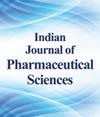辣椒素通过调节微生物群-短链脂肪酸调节膳食纤维喂养大鼠的葡萄糖代谢
IF 0.4
4区 医学
Q4 PHARMACOLOGY & PHARMACY
Indian Journal of Pharmaceutical Sciences
Pub Date : 2023-01-01
DOI:10.36468/pharmaceutical-sciences.1176
引用次数: 0
摘要
辣椒素和膳食纤维是控制肥胖和代谢性疾病的有效天然食品成分。本研究的目的是研究在高纤维饮食中添加辣椒素的抗肥胖效果。Sprague-Dawley大鼠喂食高纤维饮食和不同剂量的辣椒素。分析血浆参数、肠道菌群、胆汁酸和短链脂肪酸,以检测改善效果和可能的机制。结果表明,与高纤维饮食相比,辣椒素的添加进一步降低了空腹血糖和胰岛素,并增加了β -胆酸、去氧胆酸、鹅去氧胆酸和3 β -熊去氧胆酸。0.05 g/kg辣椒素处理的牛牛- α -胆酸钠盐和牛牛- β -胆酸钠盐含量最高,0.1 g/kg辣椒素处理的石胆酸、胆酸和羟脱氧胆酸含量最高。辣椒素增加了Akkermansia, Allobaculum等微生物的丰度,增加了短链脂肪酸,尤其是乙酸和丁酸。本研究结果表明,辣椒素的添加对体重、胰岛素和空腹血糖有较好的降低效果,其机制可能与胆汁酸组成、微生物丰度和短链脂肪酸的改变有关。本文章由计算机程序翻译,如有差异,请以英文原文为准。
Capsaicin Regulates Glucose Metabolism in Rats Fed with Dietary Fiber by Regulating Microbiota-Short Chain Fatty Acids
Capsaicin and dietary fiber are effective natural food ingredients to control the obesity and metabolic diseases. The aim of the present study was to investigate the improved anti-obesity effects by adding capsaicin to a high-fiber diet. Sprague–Dawley rats were fed with high fiber diet, and different doses of capsaicin. Plasma parameters, gut microbiota, bile acid and short-chain fatty acids were analyzed to detect the improved effects and possible mechanisms. The results showed that the addition of capsaicin further decreased the fasting blood glucose and insulin, and increased beta-muricholic acid, deoxycholic acid, chenodeoxycholic acid, and 3 beta-ursodeoxycholic acid when compared to only high fiber diet. Administration of 0.05 g/kg capsaicin showed the highest of tauro-alpha-muricholic acid sodium salt and tauro-beta-muricholic acid sodium salt and 0.1 g/kg capsaicin resulted in the highest of lithocholic acid, cholic acid and hyodeoxycholic acid. Capsaicin increased the abundance of microorganisms including Akkermansia, Allobaculum et al. and increased the short-chain fatty acids, especially acetic acid and butyric acid. Results from our study indicated that the addition of capsaicin have better effects to reduce the weight, insulin and fasting blood glucose, and the possibly mechanism can be due to the changes in bile acid composition, microbial abundance and shortchain fatty acids.
求助全文
通过发布文献求助,成功后即可免费获取论文全文。
去求助
来源期刊

Indian Journal of Pharmaceutical Sciences
PHARMACOLOGY & PHARMACY-
自引率
0.00%
发文量
0
审稿时长
2 months
期刊介绍:
The Indian Journal of Pharmaceutical Sciences (IJPS) is a bi-monthly Journal, which publishes original research work that contributes significantly to further the scientific knowledge in Pharmaceutical Sciences (Pharmaceutical Technology, Pharmaceutics, Biopharmaceutics, Pharmacokinetics, Pharmaceutical/Medicinal Chemistry, Computational Chemistry and Molecular Drug Design, Pharmacognosy and Phytochemistry, Pharmacology and Therapeutics, Pharmaceutical Analysis, Pharmacy Practice, Clinical and Hospital Pharmacy, Pharmacovigilance, Pharmacoepidemiology, Pharmacoeconomics, Drug Information, Patient Counselling, Adverse Drug Reactions Monitoring, Medication Errors, Medication Optimization, Medication Therapy Management, Cell Biology, Genomics and Proteomics, Pharmacogenomics, Bioinformatics and Biotechnology of Pharmaceutical Interest). The Journal publishes original research work either as a Full Research Paper or as a Short Communication. Review Articles on current topics in Pharmaceutical Sciences are also considered for publication by the Journal.
 求助内容:
求助内容: 应助结果提醒方式:
应助结果提醒方式:


